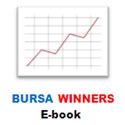Article taken from The Edge Financial Daily, November 2, 2009
| Written by Mushida Muhammad |
| Monday, 02 November 2009 10:53 |
In the high stake game of making money in the stock market, getting emotional is not an option. It is true that investors should focus on fundamentals, be patient and exercise good judgment; but alas, they are only human.
In the exuberance of a bull run or the trepidation of a bear, oftentimes there exist tendencies to inflate or deflate stocks above or below their intrinsic values disproportionately before investors realise that their optimism or pessimism was not entirely justified.
The danger lies when emotions overcome rational judgment, giving way to greed and fear. Excessive greed leads to a superfluous rise in share prices, creating a bubble which eventually sows the seeds for future panic.
Time and again, history has shown that panic often leads to a crash. In the past 10 years, greed and fear had culminated in three major financial crises; the Asian Financial Crisis, the Tech Bubble and — most recently — the Subprime Crisis.
In all cases, markets were experiencing unprecedented outperformance prior to the crash. Driven by greed, many believed that they could ride the high waves without repercussions. What lesson can be learned from this?
For one, investors tend to have a short term memory, often falling prey to the “herd mentality”. The temptation of making a killing often prompts them to take extremely high risks and disregard fundamentals for fear of missing the boat if they did.
Going back to basics. Regardless whether the objective is for the long- or short-term, investment practices should be based on fundamentals and good business judgment. Warren Buffett’s foundation has always been centralised on the principle of fundamental business analysis — a good investor should identify good businesses, purchase them at fair prices and hold them for the long term.
Success lies not in price behaviour but rather on an investor’s ability to apply sound judgment and make the distinction between market price and intrinsic value.
At a time when markets are insecure and unstable, information is key. Investors must understand the company’s business.
Thus, the onus lies with the investor to be discerning. Information is best found in financial statements, as they provide an up-to-date snapshot view of the company’s financial health and growth potential.
Some industries are inherently better for investment than others due to their intrinsic qualities. Health-care, consumer, plantation are a few sectors that generally provide better investment opportunities due to the inelasticity in demand.
Striking a balance between risk and reward is crucial, for the amount of risk taken ought to be proportionate with the anticipated reward. Assuming too much risk for too little reward gives way to bad investment.
More importantly, investors must have a stop-loss strategy to prevent escalating losses. Many a time investors make the mistake of holding on to losing stocks in the hope that it will turn around — but in reality, these stocks seldom do.
For those with a long term investment horizon, high and stable dividend income may be an important factor, as are return on equity, business sustainability, cash flow management. Corporate governance and management best practice are critical factors.
If a company reports annual growth and profits that seems “too good to be true”, it most probably is too good to be true.
Finding good stocks to invest in is difficult enough; therefore, investors should hold on to them for the long haul. Companies with a competitive edge have the tendency to increase in value over time. Eventually, the market would acknowledge the underlying value and push the price upwards.
So, when is the best time to sell? The answer is often as difficult as deciding when to buy. Depending on investor’s risk tolerance, if the stock proves to be too volatile for the nerves, it is best to sell and replace with another that lets you sleep at night.
Furthermore, social, environmental and ethical practices of many companies are now becoming a concern and investors may dispose of those that are in conflict with their social, religious or moral beliefs.
At times, the decision to sell is due to the company itself. A change in the company’s fundamentals or business plan may warrant a re-assessment on whether it is able to continue to meet the investor’s investment requirements.
There is no doubt that the stock market offers the best opportunity for higher returns in the long run. The risk is that it could dramatically erode investor’s net worth in the short-term should the down market last longer than expected. Nonetheless, it offers great opportunities.
Investors ought to rely on their judgment and not be influenced by the market. Knowing the company, finding its winning qualities and knowing when the right time to sell should aid the investor in obtaining success.
Attaching emotional value, however, is not. So be a wise investor; do not get sentimental. Have an investment objective and take the time to study before putting in your hard-earned money. Caveat emptor; be a wary investor.
Mushida Muhammad is the senior portfolio manager of the equity department, Kumpulan Wang Persaraan (Diperbadankan) (KWAP).













0 comments
Post a Comment